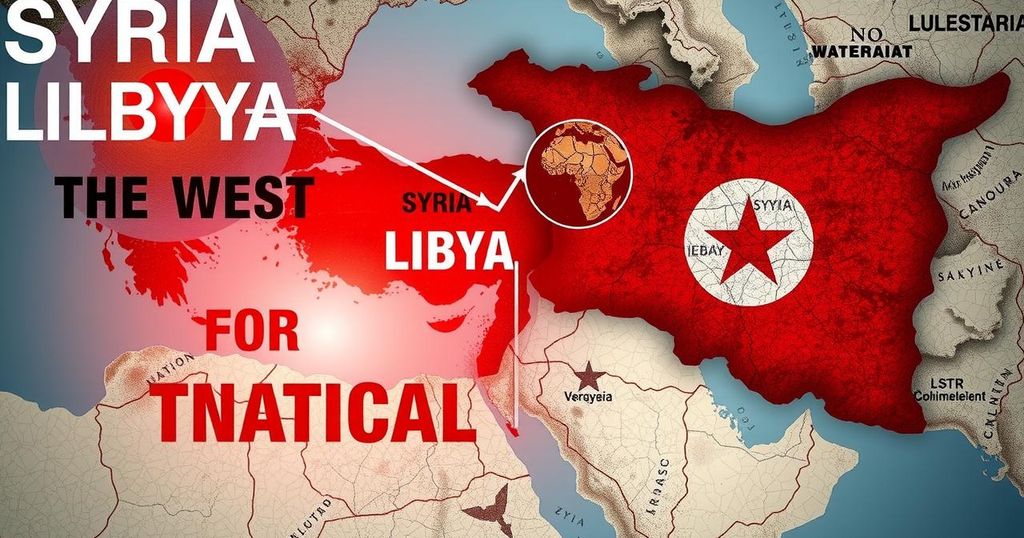Russia’s Strategic Shift: The Fragile Pivot from Syria to Libya
The article examines Russia’s shift from Syria to Libya following the fall of Assad’s regime. This transition underscores a growing reliance on Khalifa Haftar, reflecting a broader Russian strategy to counter Western influence and extend its power in the Mediterranean. The West is cautioned against misjudging Haftar’s autonomy, as his dependency on Moscow poses significant challenges. Effective engagement requires addressing Libya’s governance issues to prevent further exploitation by foreign actors.
Russia is undergoing a strategic transition from its involvement in Syria to a growing focus on Libya, raising concerns that the West might fall into a new geopolitical trap. The recent fall of Damascus highlights the precarious nature of alliances reliant on coercion and pragmatism. Bashar al-Assad’s regime, supported by Russian military and propaganda efforts, has demonstrated instability under both internal dissent and changing global dynamics. As a result, Russia is redirecting its military resources towards Libya, where the leadership of Khalifa Haftar—head of the Libyan National Army (LNA)—becomes crucial as he engages with Western powers attempting to curb Russian influence.
This evolution in Russian foreign policy reveals a desire for continuity rather than mere substitution of allies. Moscow’s earlier interventions in Syria were motivated by the need to counteract Western presence while simultaneously securing strategic gains. The support lent to Haftar during his attempted offensive on Tripoli in 2019 indicates a longstanding Russian ambition in the Mediterranean region, which has historical roots extending back to the 18th century. The evolving situation indicates Libya’s critical role in Russia’s broader strategic designs, not as a fallback, but as an element of Moscow’s established interests.
Both Assad and Haftar exemplify authoritarianism, having exchanged elements of sovereignty for regime survival. Assisting Moscow by offering a foothold against NATO, Assad has also permitted military tests, while Haftar’s role allows Moscow to disrupt Western interests and deepen its foothold in Africa. However, these leaders’ apparent strength exposes stark vulnerabilities, as witnessed in Syria, where Assad’s strength diminished as Russian backing lessened. The future for Haftar may parallel this trajectory, as dependence on Moscow’s support continues to escalate.
The West’s previous neglect and fragmented strategies during Libya’s transitional phase have inadvertently empowered Russia and Turkey, complicating Washington’s response as it attempts to disentangle Haftar from Moscow’s influence. The U.S. must recognize that Haftar’s linkage to Russia is not a matter of strategic choice but a necessity, bolstered by military support from entities such as the Wagner Group. Haftar’s power is fundamentally reliant on Moscow’s backing for military and logistical muscle, meaning that without it, his influence falters.
Moscow perceives Haftar as a functional tool rather than a reliable ally, solidifying Russian presence in critical Libyan regions while exposing Haftar’s weaknesses, particularly after the LNA’s operational setbacks in Tripoli. Despite appearing in control, Haftar’s dependence on Russian capabilities reflects his fragility—a situation that could lead to chaotic outcomes similar to those faced by past regimes in Libya and Syria. In 2023, Haftar attempted to exploit libyan oil networks, further facilitating Moscow’s interests, thus entrenching corruption and deepening Libya’s institutional vulnerabilities.
As external influence operates through figures like Haftar, the West underestimates the extent of his reliance on Russian support while overestimating his latitude in international affairs. Even allied nations, such as the UAE and Egypt, are reconsidering their commitments to Haftar based on pragmatic self-interests. Any shifts away from Russia are unlikely as this dependency limits Haftar’s leverage. The West must move beyond reactive strategies of trying to isolate influential figures from Russia and instead work towards strengthening Libya’s governance frameworks.
Drawing from failures in both Syria and Libya, the West is urged to adopt a preemptive approach that prioritizes stability over opportunism. In doing so, the United States should collaborate with global partners to enhance Libya’s financial and judicial accountability frameworks. Achieving greater resilience within Libyan governance structures could curtail external exploitation risks and foster a more stable political environment. The overarching lesson emphasizes that mere defensive actions in geopolitics yield little success; proactive measures are essential as the global order continues to evolve.
The article discusses Russia’s strategic shift from Syria to Libya and the implications this bears for Western nations. Following Syria’s deteriorating situation, influenced by both internal strife and external recalibrations, Russia is now capturing opportunities in Libya through its affiliations with Khalifa Haftar, the leader of the LNA. This dynamic illustrates the interplay of authoritarian governance and foreign dependency as Russian influence expands, highlighting the historical context of Russia’s Mediterranean ambitions and the subsequent impacts on regional geopolitics.
In summary, the West must recalibrate its approach toward Libya in light of Russia’s growing influence. Recognizing the intricate dynamics of external dependencies is crucial, particularly in the context of leaders like Haftar who are tethered to Moscow. By prioritizing governance reforms and ensuring the development of self-sufficient political structures, the West can mitigate the risks posed by foreign domination. The article serves as a cautionary note against repeating past mistakes and emphasizes the need for strategic foresight in international relations.
Original Source: www.atlanticcouncil.org




Post Comment